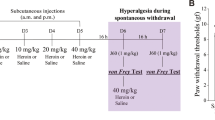Abstract
The neuropeptide αCGRP (calcitonin gene-related peptide) is involved in the complex process of pain signaling, but the precise contribution of αCGRP remains unclear. Here we show that mice lacking αCGRP display an attenuated response to chemical pain and inflammation. Furthermore, αCGRP−/− mice do not show changes in heroin self-administration or morphine tolerance, but display a marked decrease in morphine withdrawal signs, suggesting an important contribution of αCGRP to opiate withdrawal.
This is a preview of subscription content, access via your institution
Access options
Subscribe to this journal
Receive 12 print issues and online access
$209.00 per year
only $17.42 per issue
Buy this article
- Purchase on Springer Link
- Instant access to full article PDF
Prices may be subject to local taxes which are calculated during checkout



Similar content being viewed by others
References
Rosenfeld, M. G., Amara, S. G. & Evans, R. M. Science 225, 1315–1320 (1984).
Hughes, S. R. & Brain, S. D. Br. J. Pharmacol. 104, 738–742 (1991).
Gibbins, I. L., Furness, J. B. & Costa, M. Cell Tissue Res. 248, 417–437 (1987).
Morton, C. R. & Hutchison, W. D. Neuroscience 31, 807–815 (1989).
Friese, N. et al. Regul. Pept. 70, 1–7 (1997).
Huang, Y. H., Brodda-Jansen, G., Lundeberg, T. & Yu, L. C. Brain Res. 873, 54–59 (2000).
Welch, S. P., Singha, A. K. & Dewey, W. L. J. Pharmacol. Exp. Ther. 251, 1–8 (1989).
Menard, D. P., Van Rossum, D., Kar, S. & Quirion, R. Can. J. Physiol. Pharmacol. 73, 1089–1095 (1995).
Hökfel, T. et al. Ann. NY Acad. Sci. 657, 119–134 (1992).
Salmon, A. M. et al. Neuroreport 10, 849–854 (1999).
Franco-Cereceda, A. et al. Peptides 8, 399–410 (1987).
Marubio, L. M. et al. Nature 398, 805–810 (1999).
Schulteis, G., Markou, A., Gold, L. H., Stinus, L. & Koob, G. F. J. Pharmacol. Exp. Ther. 271, 1391–1398 (1994).
Damasio, A. R. Descartes' Error: Emotion, Reason, and the Human Brain (Avon, New York, 1995).
Murtra, P., Sheasby, A. M., Hunt, S. P. & De Felipe, C. Nature 405, 180–183 (2000).
Acknowledgements
This work was supported by grants from the Collège de France, the Association Française Contre les Myopathies, the Ligue Nationale Contre le Cancer, EEC Biomed and Biotech Programs BMHICT-941060 and 960236, NIH DA-05274, the National Association for Research on Schizophrenia and Depression, and Glaxo Wellcome.
Author information
Authors and Affiliations
Corresponding author
Rights and permissions
About this article
Cite this article
Salmon, AM., Damaj, M., Marubio, L. et al. Altered neuroadaptation in opiate dependence and neurogenic inflammatory nociception in αCGRP-deficient mice. Nat Neurosci 4, 357–358 (2001). https://doi.org/10.1038/86001
Received:
Accepted:
Issue Date:
DOI: https://doi.org/10.1038/86001
This article is cited by
-
Endogenous calcitonin gene-related peptide in cerebrospinal fluid and early quality of life and mental health after good-grade spontaneous subarachnoid hemorrhage—a feasibility series
Neurosurgical Review (2021)
-
Independent evolution of pain insensitivity in African mole-rats: origins and mechanisms
Journal of Comparative Physiology A (2020)
-
Is calcitonin gene-related peptide a modulator of menopausal vasomotor symptoms?
Endocrine (2019)
-
Bone Pain Associated with Acidic Cancer Microenvironment
Current Molecular Biology Reports (2018)
-
Role of calcitonin gene-related peptide in energy metabolism
Endocrine (2017)



